I’d hoped to do my January roundup straight after January ended, but I had an intense period at work and then flu which was fairly brutal. However, I am now pretty much recovered and I thought I’d share some of my recent reading.
January opened with a bit of Christmas SF and post-Christmas pulp, then got fairly literary. Overall it was a really strong reading month. February I didn’t get to read very much at all, but what it lacked in quantity it distinctly made up for in quality. My February post should be up next week.
So, introductions aside, here’s January:
Semiosis, by Sue Burke
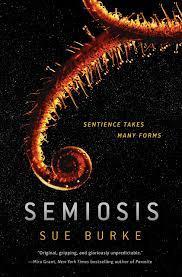
This was my Christmas SF read. It’s an interesting one – a group of idealists settle humanity’s first off-world colony and the novel follows multiple generations as they adapt to their new environment and build a new society.
The complicating factor is that their new world an older ecosystem than ours, and intelligence is much more widespread. More to the point, intelligence here has evolved in plants and popular sentiment aside plants are not cuddly – they battle each other for resources and can’t afford to give quarter because they can’t move if things don’t go their way.
After a fairly dry start I thought this was excellent. There’s a lovely examination of how a society designed to be free of religion, money, politics and all those old Earth conflicts quickly comes to develop its own schisms and fault-lines and a real sense to the precarity of the colony. There’s an original first contact scenario (two in fact, as there’s also the remnants of a previous alien colony to deal with) and a strong political thread as the colonists slowly work out how to live.
Overall I really liked this. It isn’t one for non-SF fans – the concerns are firmly SFnal – but for those who do like SF it’s worth checking out.
The Fungus, by Harry Adam Knight
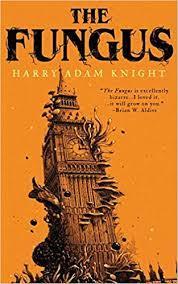
I always seem to fall ill after Christmas – probably something to do with allowing myself to relax or possibly just my habit of seasonal excess. That means I usually read a light New Year read. This year I chose some pulp horror.
Harry Adam Knight’s books (actually a duo, it’s a pseudonym) date back to the 1980s and are firmly in that James Herbert/Shaun Hutson/Guy N. Smith vein of horror. Books with titles like Rats, or Crabs, or Slugs. You get the idea.
The template tends to involve scenes of quite egregious gore and often distinctly gratuitous sex. I loved them as a teenager, which is probably the best age for them. As an adult the gender politics of these novels tends to stick out a bit more obviously and they can be a bit ugly in that regard (excepting Herbert, who I think deserves better recognition in the horror canon).
Here Knight posits a fungal apocalypse, as some chemical agent causes otherwise ordinary fungi to bloom at extraordinary rates and infect humans. It leads to some actually pretty good scenes of a phantasmagorical London remade by giant mutant fungal blooms and populated by half-mad infected survivors. It’s gleeful schlock, fun if you like this sort of novel but if you’re not now and never were a 14-year old boy it might not be for you.
The Last Children of Tokyo, by Yoko Tawada and translated by Margaret Mitsutani
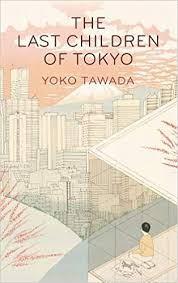
This has already been very widely written about, not that I seem to have preserved any of the links to the many excellent reviews of it I’ve read (which I do normally try to do). I dug out though Grant’s review from 1streadingblog here as it was the review which pushed me over the edge into trying this.
It’s set in a future Tokyo in a blighted Japan, where the elderly are living lives of indefinite duration but the young are sickly and infirm. It’s a mirror of course of the real challenge Japan faces of an aging population where people are dying faster than they’re being born.
Although this is clearly an SF novel, this is one I’d happily recommend to those with no interest in that form. There’s no interest here in the causes of whatever slow apocalypse is engulfing Japan, nor much in how the rest of the world is faring. Instead it’s more an examination of generational failure and guilt.
In the real world today we have children skipping school to protest about environmental collapse. Parents naturally want to leave a better world for their children than the one that was handed to them, but we have new generations growing up who’re poorer than their parents and have no real prospect of ever catching up. In the longer term, many of us I think expect to be judged harshly by those who come after us for the environmental legacy we leave behind us.
In Last Children, spry Centenarian Yoshiro tries his best to care for his great-grandson Mumei, but comes increasingly to realize that there’s nothing much he can do for him. Yoshiro’s generation already broke the world – in that context what lessons does he have that Mumei could usefully learn from?
It’s a quietly bleak novel, though often gently witty with it. It’s beautifully written and translated and powerful in its effect. Like much of the best SF it isn’t of course about the future at all. It’s about now. Highly recommended.
Three Horses, by Eri de Luca and translated by Michael Moore
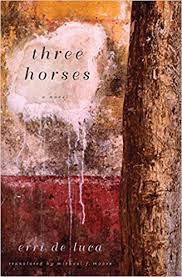
Caroline of Beauty is a Sleeping Cat wrote about this here, and Emma of Bookaroundthecorner here. I can see why both loved it, but it wasn’t my book.
Essentially, this is the tale of a 50 year-old gardener living a peaceful life in his native Italy. He falls in love with a local woman and befriends an African migrant worker. He reads novels, eats at the local tavern and lives quietly and as far as he can harmoniously.
We soon learn that his life wasn’t always so calm. He spent years in Argentina, got involved in the vicious civil war there, lost someone he loved to violence and became part of the violence in turn.
This isn’t really a naturalistic novel. The language is deeply lyrical – Emma refers to the prose as “luminous and poetic” and she’s absolutely right. The characters all seem to have a certain poetic wisdom and are prone to speaking meaningful truths to each other and as a result they all sounded kind of alike to me – a bit like they were all highly regarded Italian literary authors.
It’s a misreading though in my view to think that these are intended to be wholly realistic characters. De Luca is using highly polished language to explore themes of violence, retribution and how to live well in a compromised world and judged on the basis of what he sets out to do he absolutely succeeds.
Tentacle, by Rita Indiana and translated by Achy Obejas
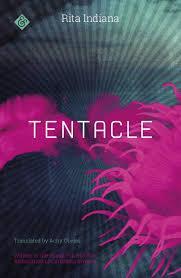
Grant wrote this up at 1stReading Blog here. He loved it and so did I. I fully expect it to make my end of year list.
Tentacle is published by Andotherstories, and I have a subscription with them which is how I ended up with this. I didn’t buy it and if I’d seen first the description which involves a time traveling transgender street kid fighting an environmental apocalypse with secret magical powers obtained from a psychic anemone, well, I wouldn’t have gone near it.
That would have been my loss, because it is quite simply brilliant. It’s muscular, strange, has a persuasive internal logic (though not always an easy to follow one) and is just bursting with energy and life. Again, highly recommended.
Rustication, by Charles Palliser
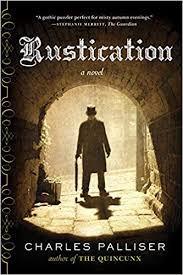
Charles Palliser is best known for his magnificent novel The Quincunx, a large and extraordinary tightly constructed Victorian sort of gothic-mystery which I regard very highly indeed. He also wrote The Unburied, a much shorter exercise in Victorian Gothic which kept me up until 3am turning pages as it was simply so well crafted.
After those came a long silence, then The Rustication. It’s an unreliable narrator piece again in a Victorian gothic vein, but whereas The Quincunx and The Unburied both carried that off with style here it didn’t come together for me. I found the narrator a little too dense in not noticing some pretty obvious clues around him as to what was going on, the plot a bit too unlikely, and the whole thing just not as good as its predecessors.
So it goes, and hopefully it will find readers better attuned to it than me, but I thought this one a miss. The Quincunx and The Unburied are both excellent though and worth looking into if you don’t know them.
Fen, by Daisy Johnson
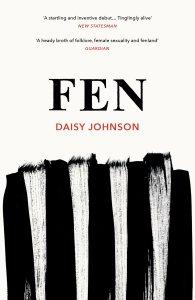
How to write about this? It’s a first short story collection from a young English writer. It’s set in her native East Anglia, and draws on local folklore and the power of a landscape in which nothing seems fixed – the fens themselves an uncanny blend of sea and earth.
In the opening story a teenage girl starves herself, cleverly disguising it from her parents (though not from her sister). It’s of course a story of anorexia, save that as she grows thinner she slowly starts to turn into a giant eel, transforming her old body to one of her own devising. In another story a girl’s dead brother may or may not come back in the form of a fox. Little here is certain, except that’s not true as Johnson cleverly roots her tales in the prosaic.
Young women may lure men to their lair in order to devour them, but they find their victims in the local pub. The towns and houses these characters inhabit feel ordinary, dull even. Johnson uses folklore to bring out a sense of the strangeness of these places, and also to bring out the essence of their experiences. We of course do not transform into eels or foxes or face the untrustworthy magic that runs through these stories, but the emotions the characters feel at these events are our emotions. Johnson takes the ordinary, makes it extraordinary, and through that shows how it was extraordinary all along. That, of course, is what myth has always done.
There’s a tremendous physicality to these stories, and a blunt sexuality. It’s an impressive and unusual collection and since Johnson’s first novel is now out I hope to read that before too long also.
For those curious to know more, reviews here from the Guardian and here from Tony’s Book World.
That’s it for now. February’s books (far fewer) will hopefully be up soon.
